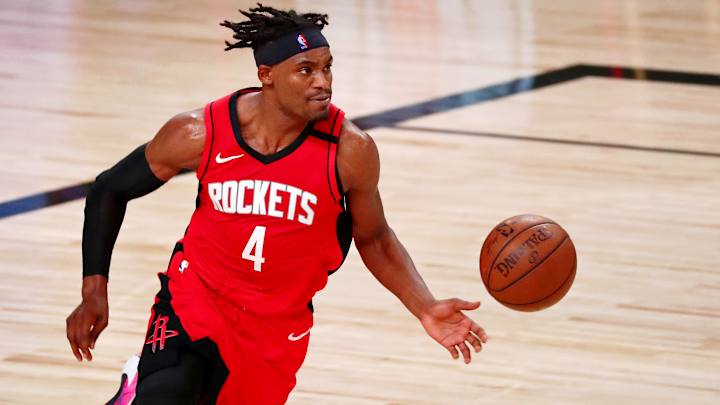Ejecting Danuel House Was the Right Call. The NBA Should've Left it at That.

LAKE BUENA VISTA, Fla. – Houston Rockets swingman Danuel House Jr. just got ejected from the NBA bubble for, in the league’s words, having an unauthorized guest in his hotel room “over multiple hours”—which, if House were single, would only help his reputation. Alas, he is married. We can only hope his pickup line was “There is no ‘I’ in Danuel, but there is a you!”
The jokes are flying, but there is more to consider. First: Nobody has officially said if this was a romantic encounter. Second: House’s decision. Look, the bubble is mentally exhausting. Players have been here a long time. Whatever their social lives looked like before the pandemic, you can be sure they had more fun than they are having in the bubble. There are moments of grumpiness, but almost no public complaining, because everybody seems to understand: This isn’t where anybody wants to be, and yet they are lucky to be here. A lot of people have it much worse than this.
The NBA had no choice but to send House home. Rules are rules, and these rules are here to protect everybody. These are not suggestions or requests. If the NBA let House stay, what would stop a dozen other players from bringing guests in? A bubble with holes is not a bubble. The NBA has spent $170 million on this experiment. It can’t risk the whole thing blowing up because a player got lonely.
House is not a victim. The Rockets are not victims of anything except LeBron James and Anthony Davis. Every team has obligations, to the league and to each other. If the Rockets are mad, they should be mad at House.
The NBA made the right call—the only call, really. But let’s also acknowledge this: It is, at the very least, weird and uncomfortable for a league to tell the world that a player had somebody in his hotel room who should not have been there. House is a professional athlete, not a religious leader or a political figure. His personal life, in normal times, is unquestionably his.
Imagine, a year ago, the NBA announcing that a player got caught with somebody in his hotel room. We would have thought it was insane.
Well, it’s 2020. Kind of a strange year, as you might have heard.
The problem is not with the NBA’s decision, which was absolutely correct, but in the announcement of it. Why not just say House violated bubble protocols, and leave it at that? Why say he had somebody in his hotel room “over multiple hours”? Does the public really need to know that?
Some context: Yahoo! Sports had already reported that House had allowed “a female COVID-19 testing official” into his room. The NBA generally strives for transparency in everything from discipline to its Officiating Last Two Minute reports. The instinct to share information and clarify what happened is admirable.
Also, the NBA did not say who the guest was. But those dots are so close together, they could form an ellipsis. Anybody paying any attention—which, one surmises, would include House’s friends and family—read the league’s statement and assumed he had a companion who was not his wife.
There are reasons for the details in the NBA’s statement. I just don’t think the reasons are good enough. And this might not seem like a big deal, but with the world shaking on pretty much a daily basis, it’s important to remember the values we had before all of this started.
The best and most famous union rep in American sports history, the Major League Baseball Players Association’s Marvin Miller, railed into his 90s against the notion that MLB could drug-test players. He considered it a horrible invasion of privacy.
I did not agree with Miller on that, but his greater point was valid. Sports leagues are highly visible operations, but these are still employer-employee relationships. The NBA had to eject House, and it had to announce that House violated protocols. It did not have to say how.

Michael Rosenberg is a senior writer for Sports Illustrated, covering any and all sports. He writes columns, profiles and investigative stories and has covered almost every major sporting event. He joined SI in 2012 after working at the Detroit Free Press for 13 years, eight of them as a columnist. Rosenberg is the author of "War As They Knew It: Woody Hayes, Bo Schembechler and America in a Time of Unrest." Several of his stories also have been published in collections of the year's best sportswriting. He is married with three children.
Follow rosenberg_mike